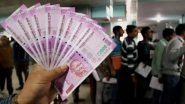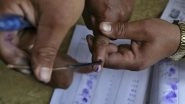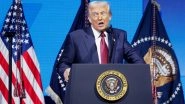Hong Kong, May 27 (AP) Major Asian stock markets were mixed on Wednesday as US-Chinese tension over Hong Kong competed with optimism about recovery from the coronavirus pandemic.
Benchmarks in Shanghai and Hong Kong retreated after the White House said a proposed national security law might jeopardize the Chinese territory's status as a global financial centre.
“Mounting US-China tensions bodes ominous for the global economy amid pandemic fragilities,” said Mizuho Bank in a report.
Overnight, Wall Street closed at its highest level in nearly three months on hopes for economic recovery as more governments reopen factories, shops and other businesses.
The Hang Seng index in Hong Kong sank 0.5% to 23,279.39 and the Shanghai Composite Index lost 0.2% to 2,841.38. The Nikkei 225 in Tokyo recovered from early losses to gain 0.6% to 21,425.38.
The law being considered for Hong Kong by the Chinese legislature has prompted warnings it might erode the independence of courts and other elements that help to make the former British colony a business center.
Hong Kong's leader tried Tuesday to reassure businesses and the public the law wouldn't threaten civil liberties.
Details of the law haven't been released, but the decision to enact it reflects the determination of President Xi Jinping's government to tighten control over Hong Kong following 11 months of anti-government protests.
The legislation would alter Hong Kong's Basic Law, or mini-constitution, to allow Beijing to compel its government to enact laws. That would circumvent a local legislature that withdrew a proposed security law in 2003 following huge public protests.
Business groups have warned that could hurt confidence in Hong Kong's legal system and make it harder to attract foreign professionals.
In Washington, President Donald Trump said he was working on a response but declined to give details.
Trump is “displeased with China's efforts and that it's hard to see how Hong Kong can remain a financial hub if China takes over,” said White House press secretary Kayleigh McEnany. She declined to elaborate.
The tensions competed with rising optimism the global economy might be recovering from its deepest slump since the 1930s as more countries easing anti-virus controls and reopening factories, shops and other businesses.
The S&P 500 rose 1.2% to 2,991.77. It is 12% below its all-time high in February.
The Dow Jones Industrial Average climbed 2.2% to 24,995.11. The Nasdaq composite rose 0.2% to 9,340.22.
Financial and industrial stocks accounted for much of the market's gains. Companies that rely on consumer spending also rose broadly. Airlines were big winners as traders welcomed data showing a pickup in air travel during the long holiday weekend.
Fears of a crushing recession due to the coronavirus sent the S&P 500 into a skid of more than 30% in March.
Hopes for a relatively quick rebound and unprecedented moves by the Federal Reserve and Congress to stem the economic pain drove a historic rebound for stocks in April and have bolstered optimism that the market won't return to the depths seen two months ago.
Fresh optimism about the development of potential vaccines for COVID-19 have also helped lift stocks. Investors are focused on the process of reopening the US economy, which is likely to accelerate over the summer.
The Commerce Department said sales of new US homes inched up 0.6% last month, a surprising gain that hints at the relative health of many consumers. Over the past 12 months, sales are down 6.2%.
Meanwhile, the Conference Board said its index of consumer confidence ticked up in May to 86.6 from a reading of 85.7 in April. The index is still down sharply from February's reading, when it climbed to 130.7.
Optimism over the prospect that consumers will be eager and able to spend money as more businesses open helped push travel-related stocks sharply higher Tuesday. Norwegian Cruise Line climbed 15.3%, Royal Caribbean jumped 14.9% and Carnival rose 12.6%.
In another confidence-boosting development on Wall Street, the New York Stock Exchange reopened its trading floor Tuesday for the first time since mid-March, when it closed due to the coronavirus outbreak.
New York Governor Andrew Cuomo rang the opening bell at the NYSE, which allowed a limited number of traders back to the floor. It required traders to adhere to social distancing guidelines and wear masks.
In energy markets, benchmark US crude lost 25 cents to $34.10 per barrel in electronic trading on the New York Mercantile Exchange. The contract rose $1.10 on Tuesday to settle at $34.35. Brent crude, used to price international oils, declined 20 cents to $36.54 per barrel in London. It rose 64 cents the previous session to $36.17.
The dollar declined to 107.48 yen from Tuesday's 107.54. The euro retreated to $1.0961 from $1.0993. (AP)
(The above story is verified and authored by Press Trust of India (PTI) staff. PTI, India’s premier news agency, employs more than 400 journalists and 500 stringers to cover almost every district and small town in India.. The views appearing in the above post do not reflect the opinions of LatestLY)













 Quickly
Quickly


